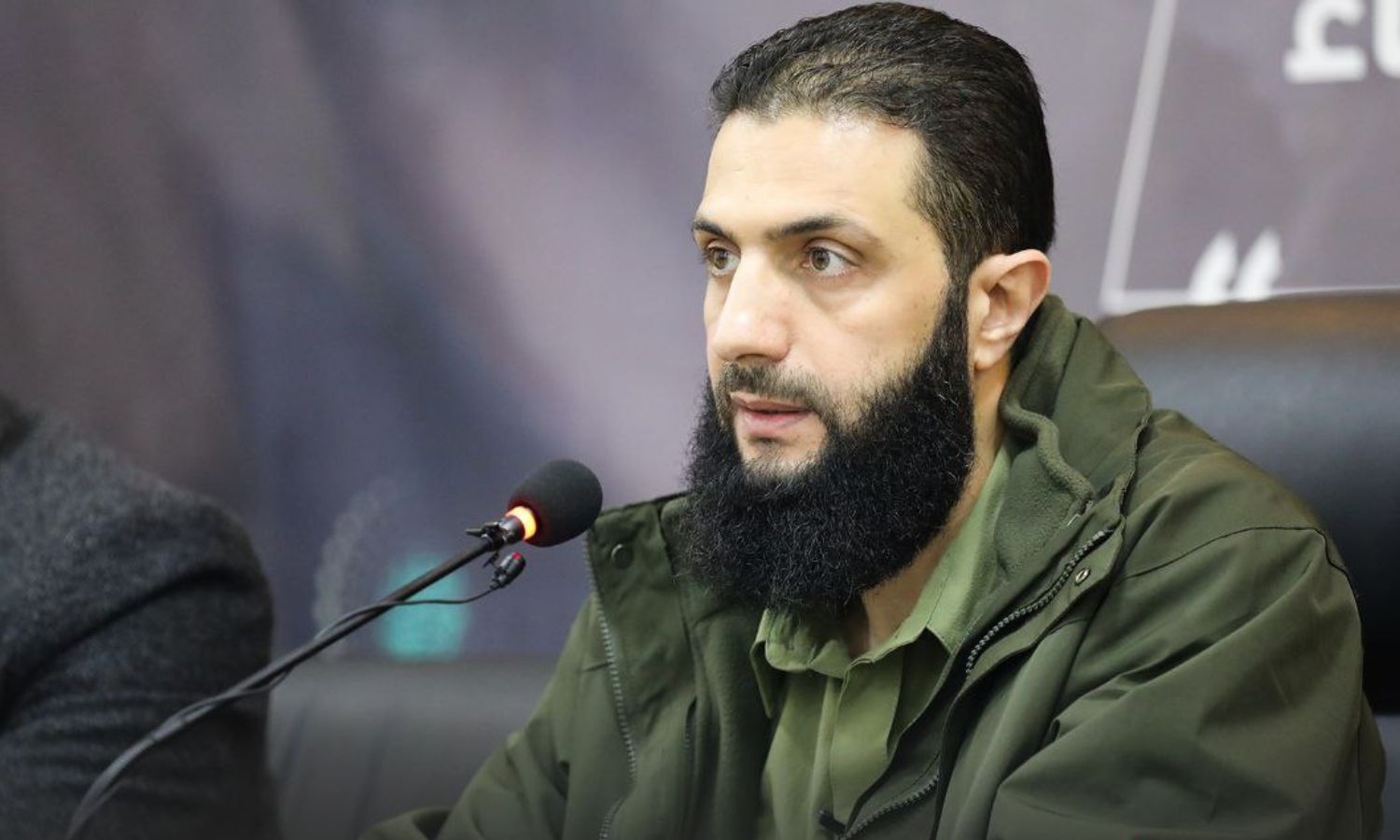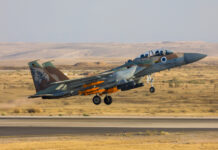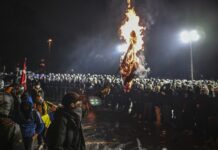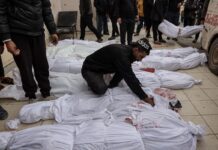Former rebel leader Ahmad al-Sharaa, who was instrumental in ousting Bashar Al Assad from power, has been appointed as transitional president of Syria for an unspecified period.
A statement announcing the news carried by the official Syrian Arab News Agency (SANA) news agency declared “victory of the revolution,” additionally confirming that all military factions, along with revolutionary political and civil bodies, will be disbanded and integrated into state institutions.
Addressing commanders while wearing his military uniform, Al-Sharaa stressed that he faced a “heavy task and a great responsibility” as Syria’s new leadership.
He said the first priority was to “fill the power vacuum in a legitimate and legal way.” Adding that civil peace should be maintained by “seeking transitional justice and preventing revenge attacks.”
The Baath Party, which ruled Syria for over 60 years, has been officially dissolved and banned along with the National Progressive Front and all affiliated organisations, institutions, and committees.
The Assad family ruled Syria with an iron fist as head of Syria’s Baath Party during that time.
Syria’s military operations administration also announced on Wednesday the repeal of the Assad-era 2012 Constitution and the dissolution of the former regime’s parliament, army, and security agencies.
Subscribe to our newsletter and stay updated on the latest news and updates from around the Muslim world!
Rise to power
The fall of the former regime headed by Bashar Al-Assad came after years of intense and bloody civil war pitting armed Sunni Muslim rebel groups against pro-Assad armed forces.
The decisive moment came on December 8, 2024, when anti-regime forces seized control of Damascus, forcing Assad to flee to Russia.
Moscow has worked as a long term ally of the Assad regime during the civil war, helping to keep Assad in power with direct military support.
A rapid assault, headed by Ahmed Al-Sharaa’s anti-Assad rebel group, Hay’at Tahrir al Sham (HTS), achieved massive gains in exploiting Assad’s weakened position amid a costly fight between Assad key regional allies Iran and Lebanon’s Hezbollah.
Iran and the Axis of Resistance had faced heavy hits by Israel during their latest confrontation over Gaza.
The Assad regime was infamous among Syrians for its brutal rule and several massacres against the majority Sunni Arab population in order to suppress calls for freedom and change.

Most Syrians celebrated the fall of Assad who was perceived by many as an oppressive and sectarian tyrant who ruled as head of a minority Alawite family.
Since taking control, the transitional authorities, led by Al-Sharaa, have moved quickly to dismantle key pillars of the former regime, including the military and security apparatus, which were known for the brutal crackdowns of the past.
Reports indicate that several high-ranking military officers from Assad’s government have either defected or been arrested.
Others have fled Syria, fearing prosecution for war crimes, or have been killed by members of HTS.
Rebuilding the military is expected to be a key priority for the transitional government, with efforts focused on creating a non-partisan army that represents all Syrians rather than serving a single political party.
The repeal of the 2012 Constitution, which was introduced by Assad’s government during the early years of the Syrian civil war, marks a major shift.
Ahmad al-Sharaa, the newly appointed transitional president, has been given the authority to form a temporary legislative council.
This council will oversee day-to-day governance and lead the drafting of a new permanent constitution.
Al-Sharaa has stated that the new political system will be inclusive and will aim to represent all political and ethnic groups in Syria. However, challenges remain, as different opposition factions may have conflicting visions for the future of the country.
Al-Sharaa political makeover
Ahmed Al-Sharaa has undergone a significant makeover amid his rise to become the new president of the Assad free Syria.
Born in Riyadh to Syrian parents displaced by Israel’s occupation of the Golan Heights, Al-Sharaa grew up in Damascus.
Witnessing decades of injustice, especially during the Second Palestinian Intifada, solidified his resolve to wage jihad which is why he decided to join Al Qaeda in Iraq after the 2003 U.S. invasion, where he gained tactical and leadership expertise.
Al-Sharaa, who was also known during this time as al-Jolani, returned to Syria in 2011 to establish Jabhat al-Nusra, an Al Qaeda-affiliated group focused on overthrowing the Assad regime.
Early support from ISIS’s Abu Bakr al-Baghdadi allowed him to build an organised, disciplined force. His leadership earned respect among opposition fighters, with many viewing him as a Syrian patriot fighting a tyrannical regime.

In 2016, Julani rebranded Jabhat al-Nusra as Jabhat Fateh al-Sham, cutting ties with Al-Qaeda. Later, this evolved into Hay’at Tahrir al-Sham (HTS), a group committed to toppling Assad. Julani justified this shift by stating: “This new formation has no relation to any external party.”
During his time serving for Western designated terror groups such as Al Qaeda Al-Sharaa had earned a $10 million American bounty on his head.
Prior to his offensive which ousted Assad, Al-Sharaa had made efforts to win over support from Western countries via interviews with American journalists where he attempted to portray himself as a changed rebel leader.
Now the West appears to be warming to the prospect of lifting sanctions on Syria and building a working relationship with the reformed Al-Sharaa.
Years of war have devastated Syria’s economy, leaving the historic Arab country reeling from widespread poverty, unemployment, and infrastructure destruction.
The new government must now faces major challenges in rebuilding the nation, restoring stability, and gaining the trust of the Syrian people, and the wider Muslim world.
The success of the transitional leadership will depend on its ability to unite political factions, implement reforms, and prevent further conflict.























